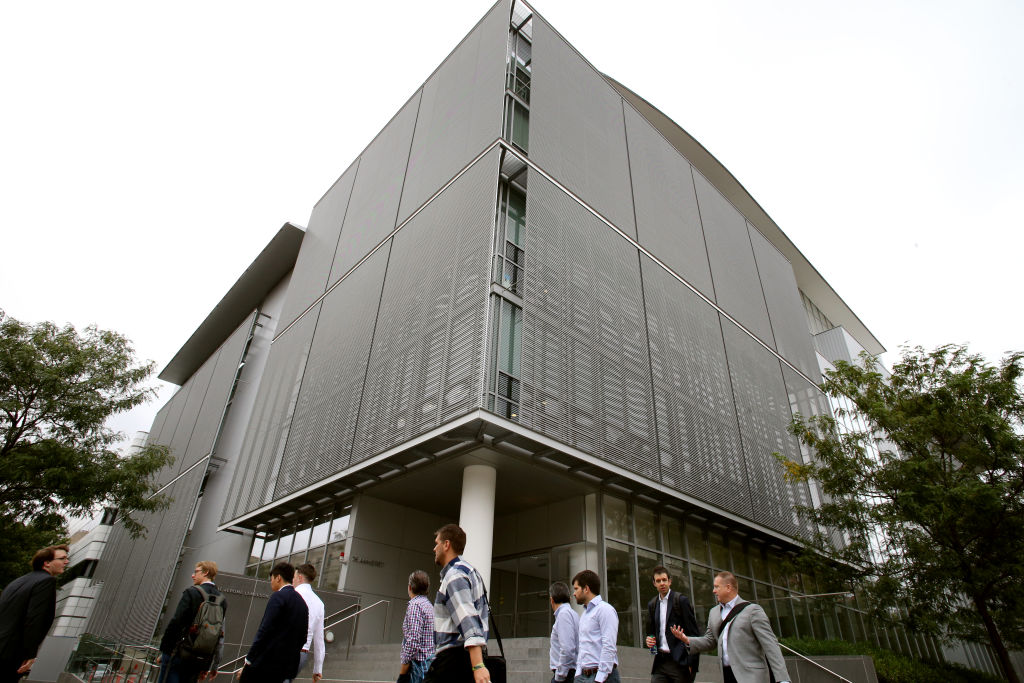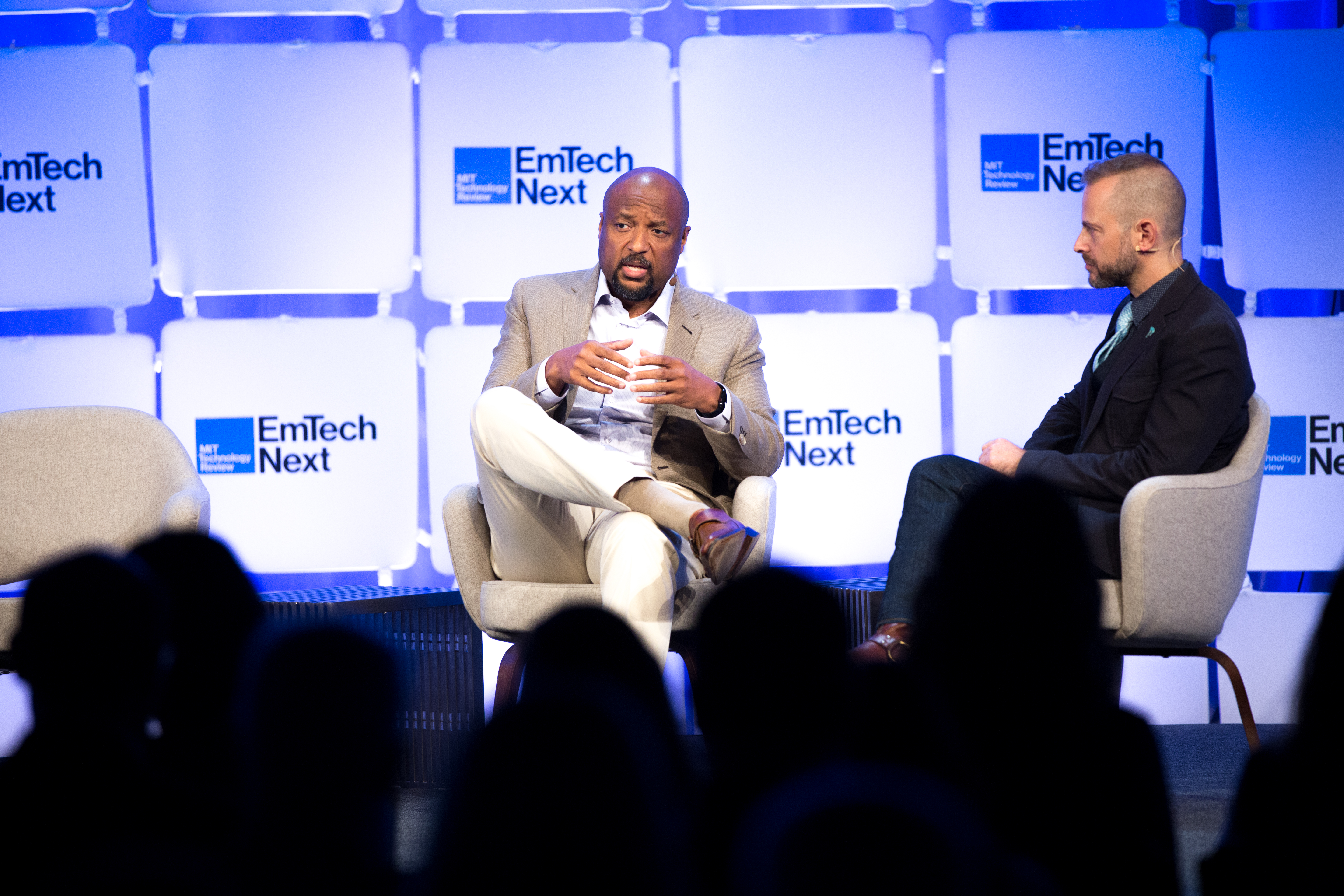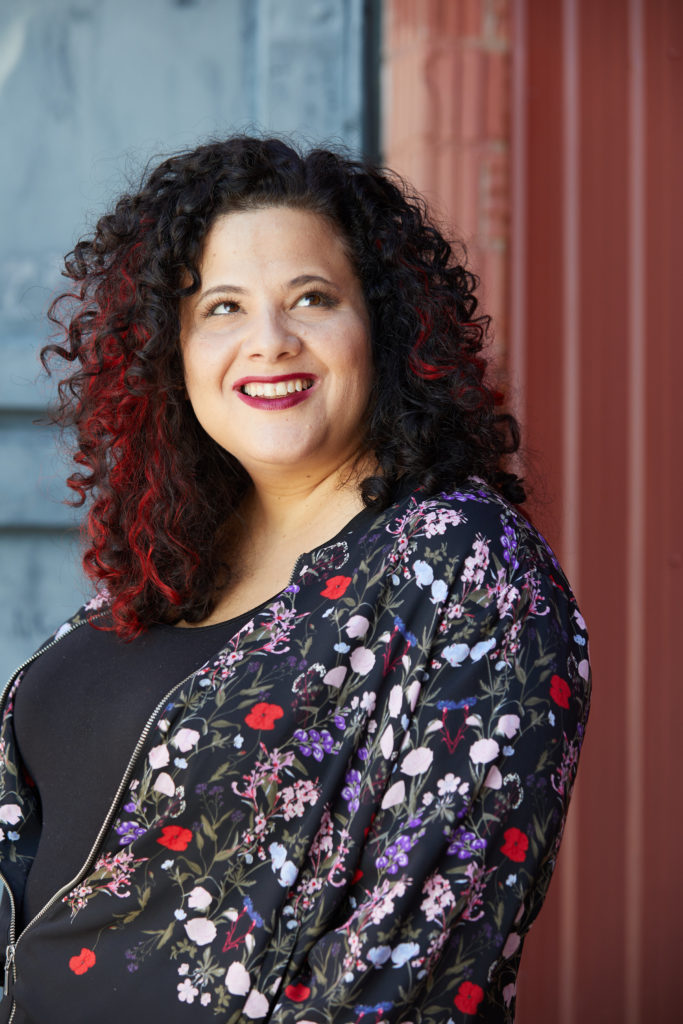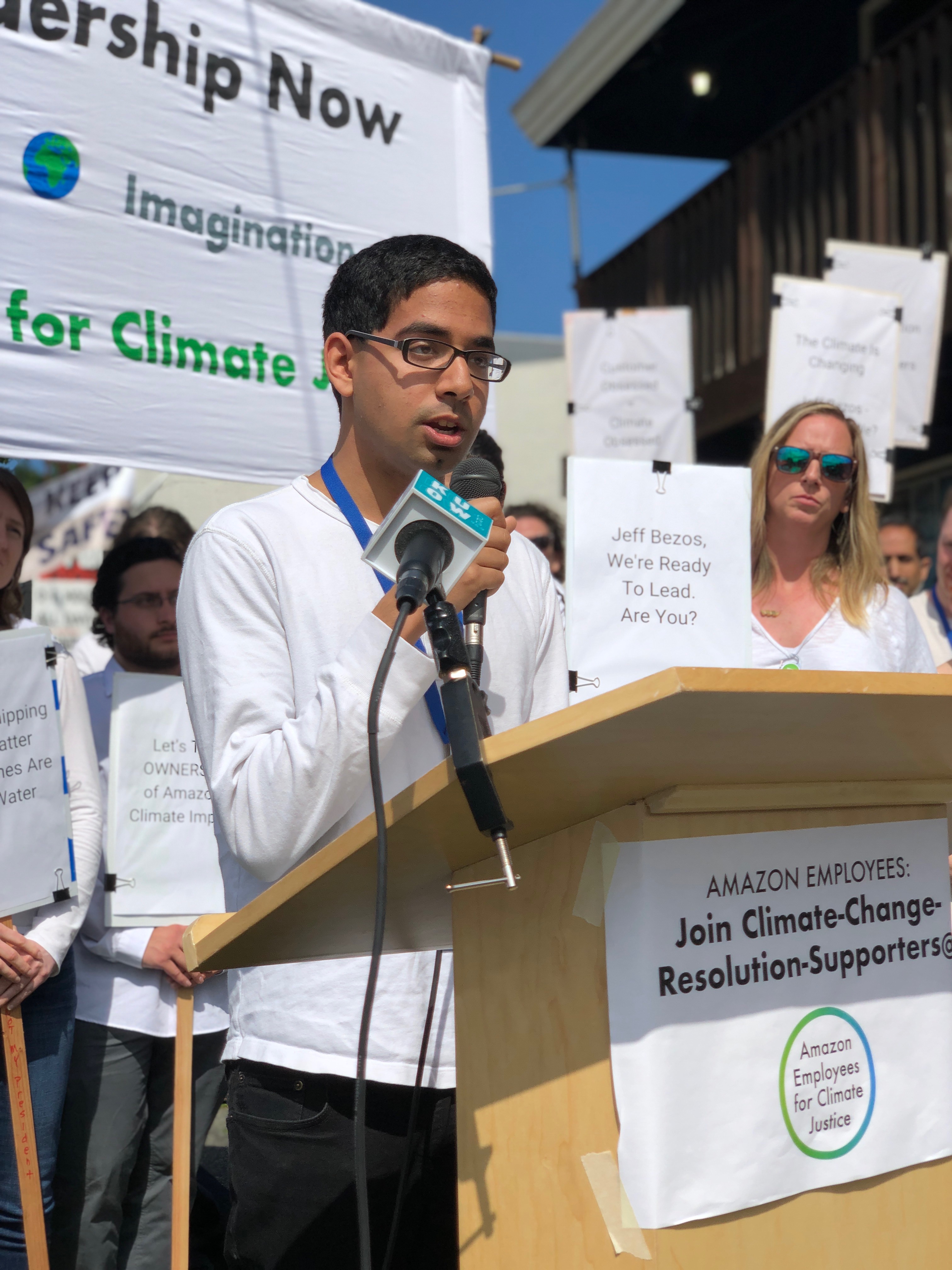If you’re like me, chances are good you just distractedly clicked on this article while scrolling through your feed in, or while waiting for, a Lyft. Maybe, like me, you need that app to get to back-to-back meetings in different locations today, as you’re well on your way to at least a 60-hour workweek between the various things you do. Maybe you’re exhausted. Maybe the ride you just took, zoning out on your phone in an Uber on Quiet Mode, was actually a lifesaver.
And as you settle into each new driver’s backseat, en route to each new destination in your crazy busy life, maybe, like me, you find yourself somewhat unwittingly implicated in one of the most contentious ethical struggles of this generation – a struggle with profound implications for the future of work.
Yesterday, California-based advocacy organizations Gig Workers Rising and Mobile Workers Alliance announced that a caravan of Uber and Lyft drivers will drive from SoCal through San Francisco to Sacramento, next Monday, August 26 through Wednesday, August 28th. Over 200 drivers in more than 75 cars plan to drive south to north, with more drivers joining along the way, to take dramatic action in advocating for California State Legislature bill AB5, and for a drivers union.
With AB5 almost certain to pass the CA Senate, this coming week presents a crucial moment in the history of gig work and tech more broadly: an opportunity for drivers to demonstrate the efficacy of 21st century labor modes of organizing, even as Uber and Lyft continue ramping up efforts to kill AB5, drop pay rates, and generally mistreat drivers.
For the first time, drivers will use their sole work tool, their cars, to demonstrate publicly (and likely disruptively, though I have no knowledge of the precise actions planned at this time) at key locations like outside Uber’s HQ in downtown San Francisco and the Capitol steps in Sacramento.
I recently had the chance to speak with Annette Rivero, one of the drivers and an organizer of the protest efforts. At the time we spoke, I didn’t know anything about Annette, not even whether she would allow me to use her last name. But this 37-year-old mother of five, a straight-A student and full-time-plus Lyft/Uber driver, told me the story of her life and career, without hesitation, even as it raised what I worried could be the possibility of retaliation against her and her colleagues.
As Annette opened up to me about drivers work conditions and their mental and physical health struggles, I found myself thinking that her family’s story puts human faces on and likely represents the trendline of an industry that, in only a decade, has moved a hundred billion dollars and given new meaning to the word “disrupt.”
I hope everyone with a stake in these issues – whether you work in tech or VC or just occasionally use your smartphone to summon a ride – will read her words and think about where all of us are headed, together.
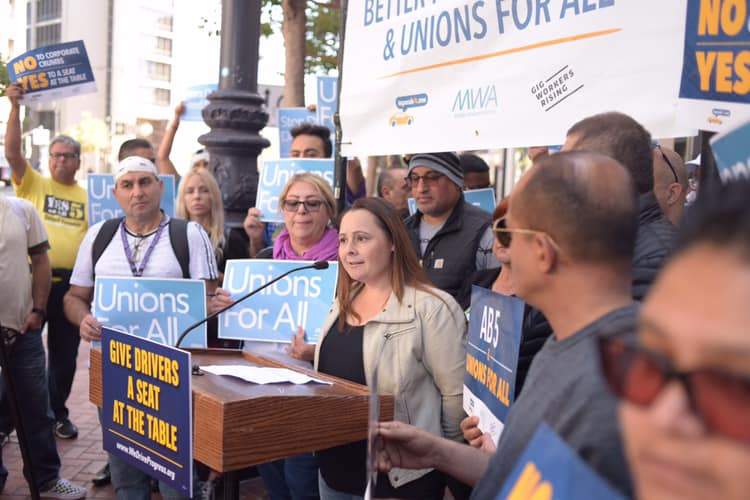
Annette Rivero. Image via Annette Rivero
Greg Epstein: Annette, thank you very much for taking the time to talk with me for this TechCrunch series exploring technology and ethics, and what it might mean to use technology ethically and humanistically today. Can you share your full name or is that not something that you’re comfortable sharing? Either way is fine.
Annette Rivero: My name’s Annette Rivero.
Epstein: How old are you?
Rivero: I am 37.
Epstein: And what do you do for your work that you’re connected with what we’re speaking about?
Rivero: I drive for both Uber and Lyft .
Epstein: How long have you been doing that?
Rivero: About two years.
Epstein: Full-time, or how does your schedule work?
Rivero: Right now I’m driving full-time, so I drive about eight to nine hours and I try to drive every day.
Epstein: Seven days a week?
Rivero: Yes.
Epstein: You’ve been trying to do that for a long time?
Rivero: All summer I’ve been really trying. I mean, of course things happen and there’s always one or two days maybe where I don’t get to, but it’s definitely my goal because I only make $150 a day. So, if I miss a day, I try to work longer on the other days.
Epstein: That’s about 60 hours a week or so.
Rivero: Yeah.
Epstein: Wow. You’re a very hard worker, Annette.
Rivero: Oh, thanks.
Epstein: And you live somewhere in California?
Rivero: I live in San Jose, so South Bay area.
Epstein: So, you’re driving 60 hours a week or so, working for a tech company not far from the global epicenter of tech.
Rivero: That’s right.
Epstein: You must get a fair number of tech people in your car with you.
Rivero: Yes, I do.
Epstein: I’ll ask you more about yourself in a moment, but please tell me what you’re involved in and how we got connected for this interview.
Rivero: Around April, or May, I got involved with a group called Gig Workers Rising. I was very frustrated with some of the things going on between me and Uber. I was looking for somebody I could confide in, exchange stories, because I felt very alone, so I signed up with their Facebook group. They invited all their new members to a conference call, which I joined, and then from there they invited us to do a health survey to talk about the problems that we have with our health as far as rideshare goes. From there I’ve been at pretty much every action and meeting.
What we’re trying to do is let everyone know what’s going on. What the drivers are going through, the decreases in pay in contradiction to the increases in rates, and really let people know that they’re kind of manipulating the system to gain profits, but they’re taking those profits from people by paying extremely low rates.
Epstein: You mentioned a health survey: how are you doing health-wise?
Rivero: [When] that was all happening, I was extremely stressed; my anxiety was through the roof and I was probably pretty depressed because my situation was looking very bleak. They had already cut the surge at the end of last year, which probably cut rates about 40% at least. Then in the beginning of this year they cut the bonuses. A combination of those things cut the money I was making per week by two thirds. I was making about $1,500 working probably less than 40 hours. And now I work about 60 hours and I’m making barely a thousand dollars. I do feel better [now], but I think I feel better because I have a community of drivers that I work with and I talk to on a daily basis. And I am working on this project to bring light to the situation. I feel more empowered than I did before.
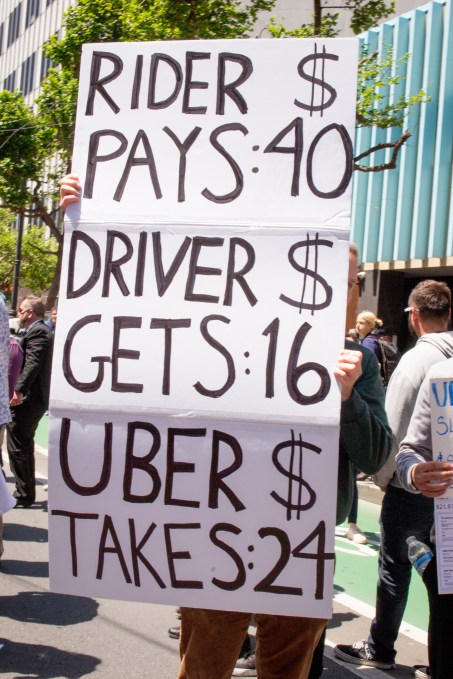
Image via Working Partnerships USA / Jeff Barrera
Epstein: Feeling empowered and being connected with people who are working together for the same cause is, generally speaking, a positive factor in health. I’m glad to hear that.
Rivero: Yeah.
Epstein: Can you tell me about the demonstration you’re about to participate in?
Rivero: Right now we’re preparing for an action to unite all the drivers in California from the north end to the south end and in the middle, which is something we haven’t been able to demonstrate yet. But [we are] going to show it’s not just one area.
We may have differences but we have one thing that’s the same and that is dissatisfaction with the way things are going with rideshare right now. Everything that’s going on is not okay and all drivers across the state have just had it. They’re just done with what’s going on. So, without giving too many details, we will be in pretty big cities throughout the state and we will be making sure that we’re seen.
Epstein: At this point it’s been announced you’ll be stopping in L.A., San Francisco and Sacramento.
Rivero: As far as what we will do in those cities, we want to keep that under wraps. But yes, we are caravaning from LA to Sacramento, and at each stop we will take an action, not just with the [driver] community but other important people in those cities.
Epstein: Sounds like whatever actions you and your colleagues are going to take are going to be the sorts of things that have never quite happened before. People interested in this issue are probably going to want to see what you all are going to do next week, huh?
Rivero: Yeah, definitely. And our message is definitely focused on not just legislators but the Senate and then Governor Newsom, because they’re our next targets — to get their attention, let them know what’s going on and how we feel. We know they’ve already heard some, but we’re trying to really drill it in.
Epstein: Gig Workers Rising is working specifically on this bill, California AB5, with regard to the status of employees and independent contractors and what rights and obligations companies like Uber and Lyft have towards contractors like yourself. What do you want to say about the bill in particular?
Rivero: All [AB5] is doing is defining even more what it means to be an employee and what it means to be an independent contractor. It doesn’t do anything else in my opinion. If there was something on the table about creating the appropriate protections, that applied more to gig workers for lack of a better word, I’m sure everybody would be looking at that.
But there isn’t, so this is what we have. And instead of having people working without protections and for extremely low labor costs, we have to do something. Because there’s a lot of people out there who are barely making it, barely surviving, can’t even put food on the table, can’t even afford healthcare.
And these companies should be held accountable for it. They should be held responsible for it.
It’s their responsibility as a business owner to give back to the community, not just take from the community. Redefining these two things is just going to help make that happen.
Epstein: I don’t mind saying I completely agree with you. If these companies want to exist, they don’t just have a right to exist purely to make their executives rich. We, the people, can take that right away from them by forcing them to shut down, unless they can show that their business model is actually decent for the human beings involved in it.
Rivero: Right. I wish more people felt the way you just worded that. People just don’t understand the power they have.
Epstein: Would you feel comfortable sharing a bit more about yourself, like who you are beyond working for Lyft and Uber, and how you got involved in driving for them originally?
Rivero: I basically worked in healthcare for about 14 years. I’m one of those people where I work hard and it doesn’t matter how much money I make, as long as the work makes me feel good. I work really hard. Throughout the years, I’ve learned many things about healthcare billing.
So, I got to a place where I was doing various things in one position, but didn’t feel like I was getting paid what I should have been paid, even though that’s contradictory to what I just said. I felt like I could be a manager and make more money so I can take care of my kids, send them to school.
And my parents are getting older. So I was thinking, I can also help both of my parents start to retire, because they’re not getting younger and they’re getting sicker.
So, I made a very scary decision to leave my job at Stanford where I was making about $80,000 a year. I decided to go back to school. Some people call me crazy, but I just feel like I’m worth more than that, and I think I could’ve made more than that. So I went back to school full-time to get my degree in business management.
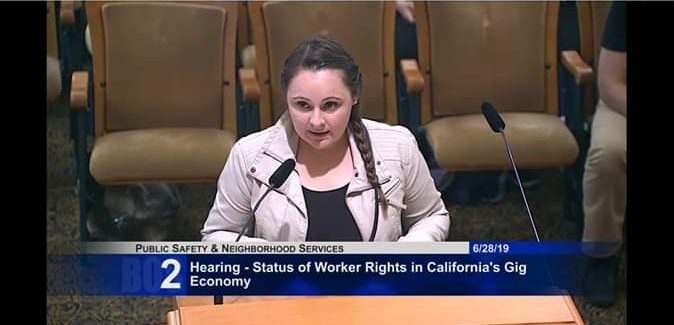
Annette Rivero. Image via Annette Rivero
Epstein: When was this?
Rivero: This was about two and a half years ago.
Epstein: So, you were making $80,000 a year or so working in the healthcare system at Stanford University Hospital, essentially? Before that had you gone to college or no?
Rivero: No.
Epstein: And you grew up in the San Jose area, or somewhere else?
Rivero: Half of my life, I grew up in San Jose and then the other half I grew up in a small town called Hollister, an hour South of here. I always wanted to go back to school and it was just such a big thing for me and then I just felt like it was now or never.
Because the situation I was in, we lived in an apartment that was affordable and I had money saved up. It wasn’t impossible. But once I started driving about six months in, or maybe within those first six months, I started to notice a subtle decrease in pay, and it was so subtle, you could hardly tell.
Epstein: You started driving while you were going to school full-time, to put yourself through school?
Rivero: Mm-hmm.
Epstein: Wow.
Rivero: I only had to work about six hours a day.
Epstein: Only! You were working six hours a day and then you would go to class or study?
Rivero: Yeah. And I was only working like four, maybe five days, making more money then than I’m making now. And the classes I did take, I did get straight A’s, so thank you. It was possible. It’s not like something I made up or fabricated. And a lot of people were doing it.
I can’t tell you how many people I’ve met who drove and were going to school or went on elaborate vacations, making extra money off of Uber and Lyft. But you can’t do that now. It’s not possible.
Epstein: You were driving five, six hours a day, studying and getting straight A’s, and did you have a family?
Rivero: One of our kids is already grown, but we have four that we’re raising.
Epstein: What does your partner do during the day?
Rivero: He is a warehouse manager for a plumbing company; he works anywhere from eight to 12 hours a day.
Epstein: You are obviously both extremely hard workers, trying to better your lives. This is very impressive.
Rivero: Thank you.
Epstein: Tell me how it started to get worse.
Rivero: To break it down a little bit, when you first start on, they give you really great bonuses. Then, little by little, they make changes to your bonus amount.
They’ll either lower the amount that you receive or they’ll increase the rides. So gradually you don’t notice, but the amount extra you’re getting per ride is lowering.
After that, [rates] started to decrease, and surge rates changed. What they used to do is a multiplier So, if there is a ride I usually do that I can make $8 off of and there was a surge during that time, then it would say ‘times two.’ That means I would make $16 off of that ride.
Today, they put a dollar amount instead; let’s say they just put $2. That means that I’m only going to make an extra $2 on that eight, from making $16 during surge to $10 during surge. And a majority of rides are during those times of surge, before work and school, when everyone’s trying to get somewhere, after work and school when everyone’s trying to get home, or on weekends when everybody’s partying.
Epstein: Which means drivers like you have to work at some of the times when it would be most convenient to be with your families. I just last week did another column largely about the effects of people having to be constantly available that way.
Rivero: Right. I can’t always work those times because I need to be with my family. So, instead of making a little more money during those times when it’s busier, I have to work slow times and make less money. But the reason we’re making less money is because the system is oversaturated with drivers, and that’s been done intentionally.
They were giving out really large bonuses to get drivers on board. I recruited my dad and made $500 for recruiting him. They’re constantly having new drivers recruited and now they have so many drivers, they don’t have to pay a surge anymore.
Because there’s more than enough drivers on the road at all times. Which brings me to another point, which is they’re charging riders for high demand rates when it’s not even necessary because they have so many drivers on the road. They don’t need to charge high rates. There’s somebody around the corner.
Epstein: I stopped using Uber for ethical reasons, but I use Lyft. I live someplace where it’s really hard to get from my house to work with public transportation and I work three or more jobs while spending a lot of time with my young kid, so I’m constantly running from one place to another and I definitely don’t have time to park a car.
it’s amazing: no matter where I am, or when, there’s always a car within a few minutes. And I take all these rides and almost never get the same driver twice. And I go to other cities or states, even remote areas: there are Lyft drivers everywhere.
It’s amazing how many people, like yourself, they’ve put out onto the road. What is that like for you? What have you heard from colleagues or friends through Gig Workers Rising, about what this is like for them?
Rivero: A couple of friends can’t afford their medication. One of them has high blood pressure. I could lose a friend because he can’t afford his high blood pressure medicine, because he doesn’t make enough. But he doesn’t qualify for Medi-Cal because we have to file all that money we’re paying Uber and Lyft on our taxes.
It looks like we’re making all this money, but we’re not. I have another friend who had kidney failure last year because drivers don’t want to drink water. They don’t want to have to stop to go to the bathroom because then that stops them from making money.
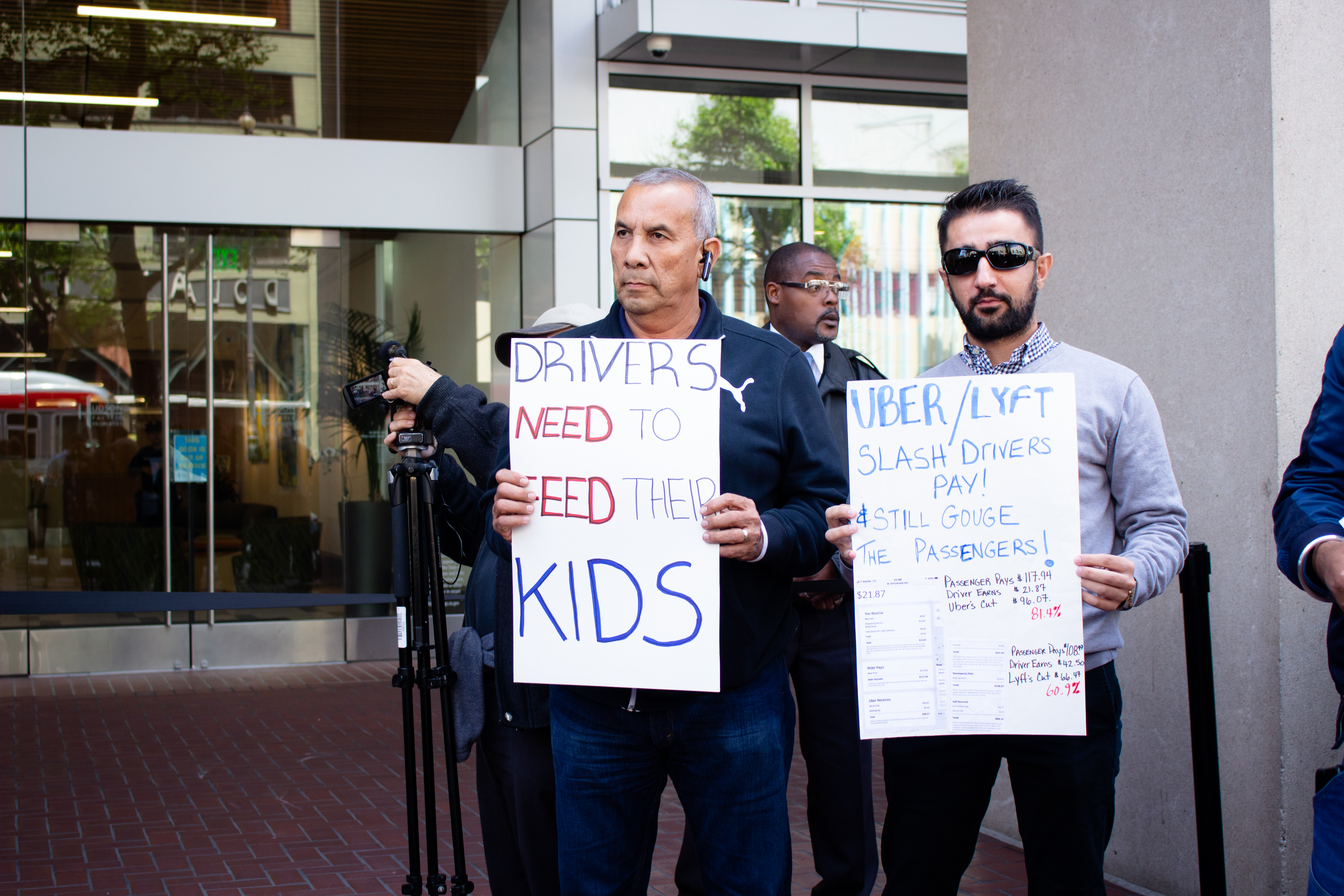
Image via Working Partnerships USA / Jeff Barrera
Epstein: What do you do about stopping to go to the bathroom, Annette?
Rivero: When I drop the kids off in the morning at 7:15, I’ll have one coffee and I’ll probably have to go to the bathroom once. So I’ll stop either at a Starbucks, a grocery store, or a Target. Then I don’t eat until I get home, which is when I pick up the kids at 3:45 and then I take them home.
Epstein: So, you’re driving around all that time on one or two coffees, no water, and no food?
Rivero: That’s right.
Epstein: First of all, I’m concerned for you. It’s not particularly healthy to sit in a car for eight or nine hours a day. Do you stretch much?
Rivero: Yeah. Sometimes I’ll get out of the car. When people need help, I’ll get out and help them. If I’m-
Epstein: I’m always telling my drivers to get up and stretch because it’s really bad for a person to sit without even stretching their legs for eight, nine hours a day. But then… I say this with a smile and I actually really trust you, you seem like an amazing person. But, are you being safe out there? I mean, all those hours without eating or hydrating, that doesn’t seem like the best mindset to be driving in.
Rivero: I have a goal, every day, to make $150. [Recently,] at the end of [the night] I needed 30 more dollars, and I was like, “Okay, I’m tired and I want to stop.” But I wasn’t at the point where I was dangerously tired. When I say dangerously tired, I mean I have a migraine, my eyes are getting blurry, or I’m so tired I’ve made a mistake, like I was at the light and I could have turned right but I just wasn’t paying attention.
Something small like that. I’ve never caused an accident. I’m not irresponsible in that way, but I notice the subtle things about myself when I know it’s time to go home.
But yeah, without a doubt there are drivers out there who are driving beyond that moment when they realize they shouldn’t be driving. They’re driving anywhere from 10, maybe 14, maybe even 16 hours a day.
And the ones sleeping in their car don’t really sleep. How do you sleep in your car?
Epstein: Are a lot of drivers sleeping in their cars, in your experience?
Rivero: I know a lot of drivers sleep in their car.
Epstein: How do you know that?
Rivero: Well, friends. My dad sleeps in his car. My dad’s too proud to come sleep at my house, but he’ll stay in his car. And he’s not sleeping.
Epstein: Why? Because he doesn’t have someplace to go?
Rivero: He lives in Los Banos, about an hour and a half away. Not only that, he can’t really afford the gas to keep going back and forth every night.
Epstein: Right — if you’re driving Lyft or Uber, almost by definition you can’t afford to live in a high rent area, but of course most rides are in high rent areas. So almost by design, most of the drivers are living far away from where they’re working, and when you get them so exhausted that they can’t drive home, it sounds like they’re essentially living out of their cars for how many days a week.
Rivero: Exactly. I also know another person who, from the loneliness of sleeping in their car and just the loneliness of not talking to anybody, because drivers don’t talk to each other really. He became-
Epstein: Yeah. And there’s even this new… What is the mode again for Uber?
Rivero: Oh, the quiet mode?
Epstein: Can I just say that I find that disgusting? You’re going to make me work for how much? And then you’re going to act like you have the right to just tell me I’m a nuisance to you and don’t talk to you?
Rivero: I understand sometimes people want to just not say anything, but it’s the way that it’s been done that’s terrible. It’s really about why can’t people communicate and just say, “You know what? I’m so sorry but I’m exhausted today. I had a really long day,” or whatever.
You don’t even have to explain. You just have to say, “Do you mind if we just not conversate right now? Just not up for it.”
Epstein: Yes. Suck it up and use your words to say that you don’t want to use your words, bro.
Rivero: Exactly. And that’s how we’re treated on a daily basis from, not all riders, but there are riders that treat us that way.
Epstein: Anyway, I interrupted you earlier. We were talking about you and other drivers risking their health, some people risking the health of others on the road. People certainly putting their mental health at risk is something that I hear here: there’s a lot of loneliness, isolation.
Rivero: The person I was talking about that was lonely actually had a drug addiction: coke. And the coke was initially to stay awake, then became a bad habit because they were lonely and depressed and then they couldn’t stop.
Epstein: And that person’s still out there driving?
Rivero: Not at the moment. Money all went to the coke and they couldn’t pay the bills. Got a ticket, lost a license.
Epstein: Still, what I’m hearing is that these kinds of situations that people are being put into make that kind of story, and its dangers, more likely.
Rivero: Yes. Yes.
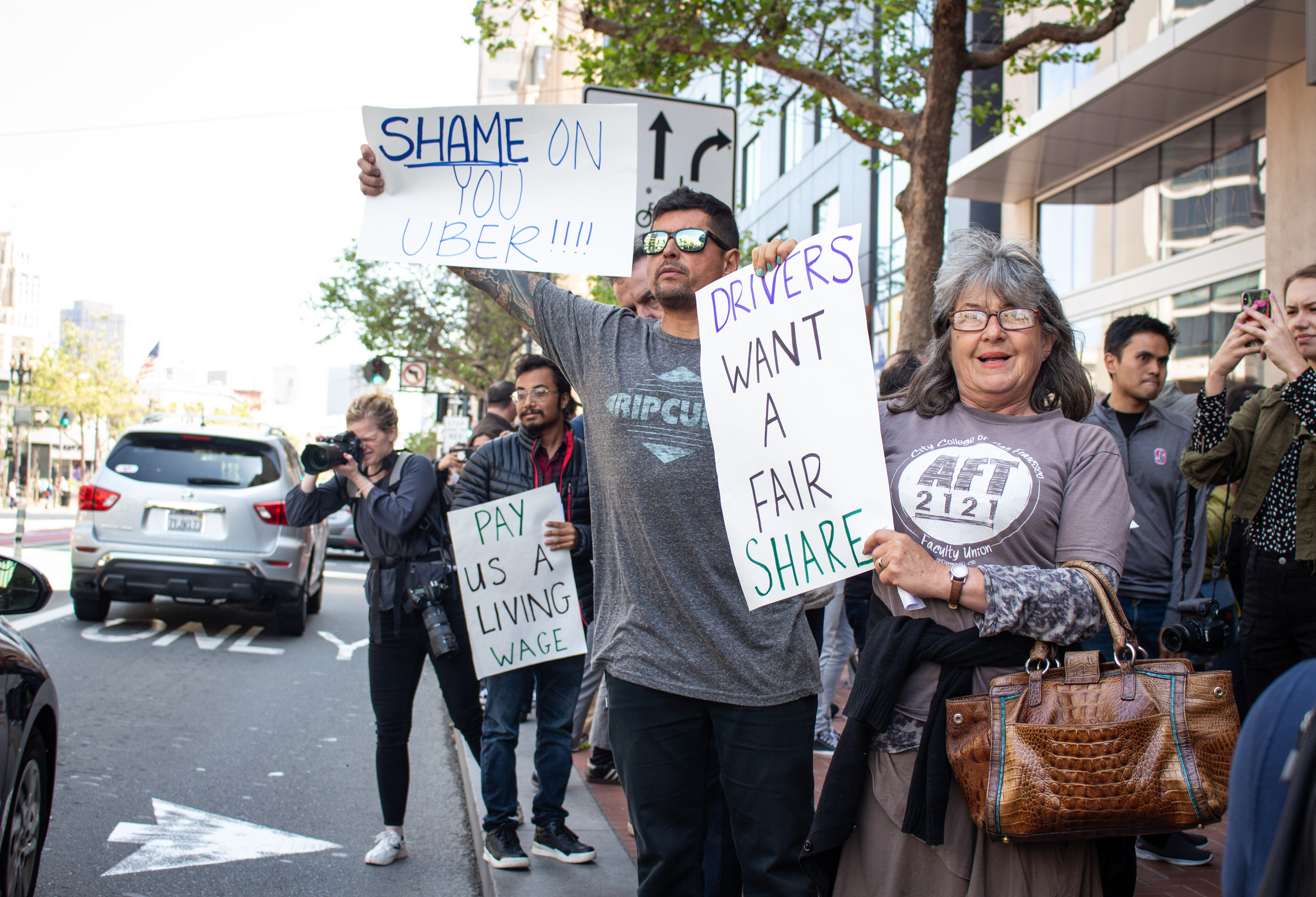
Image via Working Partnerships USA / Jeff Barrera
Epstein: So, now you’re part of a group taking action to try to bring about some change. What do you most want people to think about and feel when they see you and your fellow drivers, your fellow gig workers, your fellow human beings driving across the state of California and demonstrating next week?
Rivero: I want everybody to think about where they work and to imagine that one day they walk in and their boss tells them, “We’re going to make you an independent contractor today. Congratulations. You get to set your own schedule. You get to have the flexibility you want, but we’re no longer going to pay you your benefits, your retirement plan, or anything else we gave you as an employee.”
Because I have security guards in my building at home, who are independent contractors, who I thought were employees collecting benefits. Companies like Bench, who provide accounting and bookkeeping services, [have] admitted they want to provide the cheapest and fastest service possible.
What that’s going to do is put businesses out of business in [those industries], and they’re not going to be the last. So, I want people to think about their jobs; they could be next if we don’t put a stop to [the current practices of] Uber and Lyft, because they’re the example of where we’re going.
Epstein: There are certainly many billions of dollars involved in Uber and Lyft and a lot of relatively wealthy people feel that they have something riding on the success of those companies.
Is there anything else that you want to share in gearing up for these actions next week?
Rivero: Just that AB5 doesn’t take away anybody’s flexibility, it’s the companies that take away the flexibility. Because I know that that’s something that everyone’s stuck on right now, and it’s a lie. There’s no truth to it.
Epstein: The last question I ask at the end of all of my TechCrunch interviews about technology and ethics is, how optimistic are you about our shared human future? About the future that we all share together, as human beings?
Rivero: That’s a day by day question because I feel like things change so much. Some days it just feels like we go five steps back. Right now, in my world, we’ve gone way back. It’s just evolving. So I really can’t give a defined answer.
Epstein: That’s a good answer, regardless. Thank you very much.



